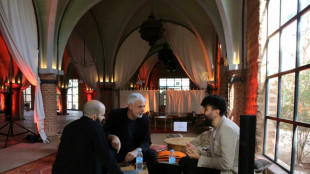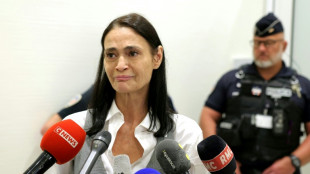
-
 Iran Nobel winner released for three weeks, 'unconditional' freedom urged
Iran Nobel winner released for three weeks, 'unconditional' freedom urged
-
Red Cross marks record numbers of humanitarians killed in 2024

-
 Johnson's Grand Slam 'no threat', says World Athletics boss Coe
Johnson's Grand Slam 'no threat', says World Athletics boss Coe
-
Qatar's emir and UK's Starmer talk trade as state visit ends

-
 Cuba suffers third nationwide blackout in two months
Cuba suffers third nationwide blackout in two months
-
Russia, Ukraine to send top diplomats to OSCE summit in Malta

-
 Spanish royals to attend memorial service for flood victims
Spanish royals to attend memorial service for flood victims
-
LPGA, USGA new policy requires female at birth or pre-puberty change

-
 Stick to current climate change laws, US tells top UN court
Stick to current climate change laws, US tells top UN court
-
British Museum chief says Marbles deal with Greece 'some distance' away

-
 Pope Francis receives electric popemobile from Mercedes
Pope Francis receives electric popemobile from Mercedes
-
Gaza civil defence: thousands flee Israeli strikes, evacuation calls

-
 Trump names billionaire private astronaut as next NASA chief
Trump names billionaire private astronaut as next NASA chief
-
Pidcock to leave INEOS Grenadiers at end of season

-
 Seoul stocks weaken, Paris advances despite political turmoil
Seoul stocks weaken, Paris advances despite political turmoil
-
South America summit hopes to seal 'historic' trade deal with EU

-
 DAZN awarded global TV rights for Club World Cup
DAZN awarded global TV rights for Club World Cup
-
Top executive shot dead outside New York hotel

-
 Vaping while still smoking unlikely to help quitters: study
Vaping while still smoking unlikely to help quitters: study
-
British Museum chief says Parthenon Marbles deal with Greece 'some distance' away

-
 'Creating connections': Arab, African filmmakers gather at Morocco workshops
'Creating connections': Arab, African filmmakers gather at Morocco workshops
-
Iran frees Nobel winner for three weeks, sparking calls for 'permanent' release

-
 Brazil's Minas cheese gets added to UNESCO list
Brazil's Minas cheese gets added to UNESCO list
-
Top US executive shot dead in New York City: media

-
 Trump's nominee to run Pentagon hangs by a thread
Trump's nominee to run Pentagon hangs by a thread
-
GM announces more than $5 bn hit to earnings in China venture

-
 World chess champ Ding, teen challenger tied past halfway mark
World chess champ Ding, teen challenger tied past halfway mark
-
Georgia police raid opposition offices as PM vows to curb protests

-
 S. Korea opposition begins push to impeach president
S. Korea opposition begins push to impeach president
-
Syrian army fights rebel offensive with counterattack

-
 France court upholds Polanski acquittal in defamation case
France court upholds Polanski acquittal in defamation case
-
UK bans daytime TV ads for cereals, muffins and burgers

-
 Palace's Guehi to face no formal action over 'Jesus' message on rainbow armband
Palace's Guehi to face no formal action over 'Jesus' message on rainbow armband
-
UK faces trade balancing act with Trump, EU

-
 Iran releases Nobel Peace laureate Mohammadi on medical leave: lawyer
Iran releases Nobel Peace laureate Mohammadi on medical leave: lawyer
-
UNESCO grants heritage status to Aleppo soap as Syria war flares

-
 Ghana's illegal mining boom seeps into presidential election
Ghana's illegal mining boom seeps into presidential election
-
Inconsistent Spurs 'progressing in all aspects': Postecoglou

-
 France's Orano says Niger junta controls uranium firm
France's Orano says Niger junta controls uranium firm
-
Seoul stocks weaken, Paris edges up tracking political turmoil

-
 China reports warmest autumn since records began
China reports warmest autumn since records began
-
French marine park to close over law banning killer whale shows

-
 Thousands march demanding S. Korea president resign over martial law debacle
Thousands march demanding S. Korea president resign over martial law debacle
-
Taiwan romance novelist Chiung Yao dies at 86

-
 In Angola, Biden promises to invest differently to China
In Angola, Biden promises to invest differently to China
-
Syrian army launches counteroffensive against rebels

-
 Evenepoel says 'long journey' ahead after postal van collision
Evenepoel says 'long journey' ahead after postal van collision
-
South Korea's day of rage as Yoon's martial law founders

-
 UK police question killer nurse Letby over further baby deaths
UK police question killer nurse Letby over further baby deaths
-
Cameroon curator Kouoh is first African woman to lead Venice Biennale


German GDP downgraded in new blow for struggling economy
German third-quarter growth was downgraded Friday with official data showing it expanded even more weakly than previously thought, in a new blow for Europe's top economy as it battles multiple headwinds.
The final reading of 0.1 percent growth confirmed the eurozone's traditional growth engine had narrowly dodged a technical recession, following a contraction in the previous quarter.
But it was down from a preliminary figure of 0.2 percent growth quarter-on-quarter, representing more bad news as the economy struggles with challenges from a slowdown in its crucial manufacturing sector to weak demand for key exports.
The downgrade went against predictions from analysts surveyed by financial data firm FactSet, who had expected no change.
"The data once again emphasises the extent of the current crisis in Germany," said LBBW bank analyst Jens-Oliver Niklasch. "Economic output in Germany is treading water -- at best."
ING economist Carsten Brzeski warned that, while a summer recession had been avoided, a sharp downturn in the winter may be coming.
The economy was hit in the third quarter by a 1.9-percent fall in exports compared to the previous quarter, as well as weaker investments in areas such as machinery, equipment and construction, according to statistics agency Destatis.
Consumption, however, rose by 0.3 percent quarter-on-quarter, providing vital support, according to Destatis.
The growth data laid bare how far Germany is lagging behind other major economies.
Destatis noted that Germany's economic growth was behind that of the European Union as a whole in the third quarter, with Spain, Italy and France all notching up better performances.
And it was even further behind when compared to the United States, which has put in a robust performance in recent times, the agency noted.
- Political uncertainty -
The German economy was hit hard after food and energy costs surged in the wake of Russia's invasion of Ukraine in 2022, and amid post-pandemic supply chain woes.
Germany was the only major advanced economy to shrink in 2023 and the government has previously said it expects another mild contraction in 2024, before a recovery begins the following year.
But while inflation has eased from highs, a strong rebound has failed to materialise amid weak demand from key trading partners, particularly China.
The crisis has been illustrated by a string of poor results from Germany's corporate titans, from carmakers like Volkswagen -- which is threatening to shut factories in Germany for the first time -- to those in the chemicals and pharmaceutical sectors.
Long-standing structural challenges have deepened Germany's woes, including complex bureaucracy, under-investment in infrastructure, an ageing workforce and a costly green energy transition.
Political uncertainty at home and abroad is adding to the challenges.
Germany is headed for elections in February, seven months earlier than initially scheduled, after the collapse of Chancellor Olaf Scholz's three-party coalition earlier this month.
Meanwhile Donald Trump's US presidential election victory presents a headache for German businesses, as the United States is a major destination for "made in Germany" goods.
Joachim Nagel, head of the German central bank, warned last week that if Trump pushes ahead with his pledge to impose tariffs on all imports, it could knock one percent off German output.
ING's Brzeski warned about the impact of Trump's looming return as president.
"Whether it's the prospects of tariffs or US tax cuts and deregulation indirectly undermining German competitiveness, it's hard to see how US economic policies will not be negative for the German economy," he said.
O.Krause--BTB
